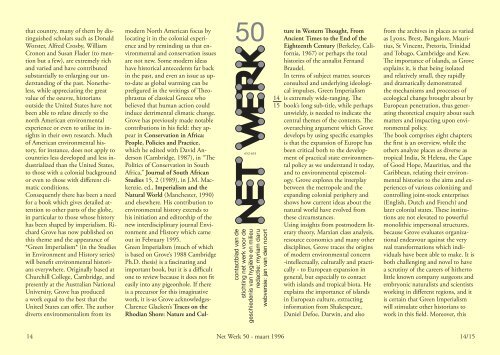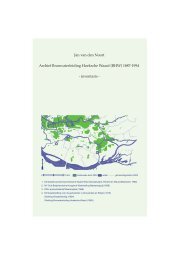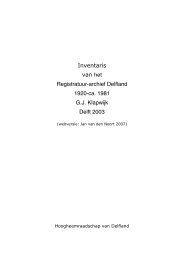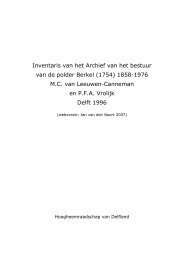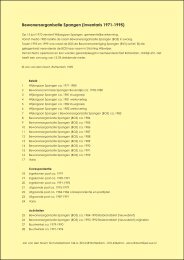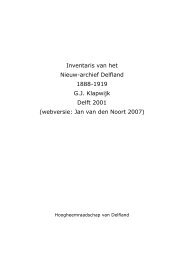Die Abwassergeschichte - Jan van den Noort
Die Abwassergeschichte - Jan van den Noort
Die Abwassergeschichte - Jan van den Noort
You also want an ePaper? Increase the reach of your titles
YUMPU automatically turns print PDFs into web optimized ePapers that Google loves.
that country, many of them by distinguished<br />
scholars such as Donald<br />
Worster, Alfred Crosby, William<br />
Cronon and Susan Flader (to mention<br />
but a few), are extremely rich<br />
and varied and have contributed<br />
substantially to enlarging our understanding<br />
of the past. Nonetheless,<br />
while appreciating the great<br />
value of the oeuvre, historians<br />
outside the United States have not<br />
been able to relate directly to the<br />
north American environmental<br />
experience or even to utilise its insights<br />
in their own research. Much<br />
of American environmental history,<br />
for instance, does not apply to<br />
countries less developed and less industrialized<br />
than the United States,<br />
to those with a colonial background<br />
or even to those with diff erent climatic<br />
conditions.<br />
Consequently there has been a need<br />
for a book which gives detailed attention<br />
to other parts of the globe,<br />
in particular to those whose history<br />
has been shaped by imperialism. Richard<br />
Grove has now published on<br />
this theme and the appearance of<br />
*Green Imperialism* (in the Studies<br />
in Environment and History series)<br />
will benefi t environmental historians<br />
everywhere. Originally based at<br />
Churchill College, Cambridge, and<br />
presently at the Australian National<br />
University, Grove has produced<br />
a work equal to the best that the<br />
United States can off er. Th e author<br />
diverts environmentalism from its<br />
modern North American focus by<br />
locating it in the colonial experience<br />
and by reminding us that environmental<br />
and conservation issues<br />
are not new. Some modern ideas<br />
have historical antece<strong>den</strong>ts far back<br />
in the past, and even an issue as upto-date<br />
as global warming can be<br />
prefi gured in the writings of Th eophrastus<br />
of classical Greece who<br />
believed that human action could<br />
induce detrimental climatic change.<br />
Grove has previously made notable<br />
contributions in his fi eld: they appear<br />
in Conservation in Africa:<br />
People, Policies and Practice,<br />
which he edited with David Anderson<br />
(Cambridge, 1987), in “Th e<br />
Politics of Conservation in South<br />
Africa,” Journal of South African<br />
Studies 15, 2 (1989), in J.M. Mackenzie,<br />
ed., Imperialism and the<br />
Natural World (Manchester, 1990)<br />
and elsewhere. His contribution to<br />
environmental history extends to<br />
his initiation and editorship of the<br />
new interdisciplinary journal Environment<br />
and History which came<br />
out in February 1995.<br />
Green Imperialism (much of which<br />
is based on Grove’s 1988 Cambridge<br />
Ph.D. thesis) is a fascinating and<br />
important book, but it is a diffi cult<br />
one to review because it does not fi t<br />
easily into any pigeonhole. If there<br />
is a precursor for this imaginative<br />
work, it is-as Grove acknowledges-<br />
Clarence Glacken’s Traces on the<br />
Rhodian Shore: Nature and Cul-<br />
50<br />
652-653<br />
contactblad <strong>van</strong> de<br />
stichting net werk voor de<br />
geschie<strong>den</strong>is <strong>van</strong> hygiëne en milieu<br />
redactie: myriam d a r u<br />
webversie: jan <strong>van</strong> <strong>den</strong> n o o r t<br />
ture in Western Th ought, From<br />
Ancient Times to the End of the<br />
Eighteenth Century (Berkeley, California,<br />
1967) or perhaps the total<br />
histories of the annalist Fernand<br />
Braudel.<br />
In terms of subject matter, sources<br />
consulted and underlying ideological<br />
impulses, Green Imperialism<br />
is extremely wide-ranging. Th e<br />
book’s long sub-title, while perhaps<br />
unwieldy, is needed to indicate the<br />
central themes of the contents. Th e<br />
overarching argument which Grove<br />
develops by using specifi c examples<br />
is that the expansion of Europe has<br />
been critical both to the development<br />
of practical state environmental<br />
policy as we understand it today,<br />
and to environmental epistemology.<br />
Grove explores the interplay<br />
between the metropole and the<br />
expanding colonial periphery and<br />
shows how current ideas about the<br />
natural world have evolved from<br />
these circumstances.<br />
Using insights from postmodern literary<br />
theory, Marxian class analysis,<br />
resource economics and many other<br />
disciplines, Grove traces the origins<br />
of modern environmental concern<br />
-intellectually, culturally and practically<br />
- to European expansion in<br />
general, but especially to contact<br />
with islands and tropical biota. He<br />
explains the importance of islands<br />
in European culture, extracting<br />
information from Shakespeare,<br />
Daniel Defoe, Darwin, and also<br />
from the archives in places as varied<br />
as Lyons, Brest, Bangalore, Mauritius,<br />
St Vincent, Pretoria, Trinidad<br />
and Tobago, Cambridge and Kew.<br />
Th e importance of islands, as Grove<br />
explains it, is that being isolated<br />
and relatively small, they rapidly<br />
and dramatically demonstrated<br />
the mechanisms and processes of<br />
ecological change brought about by<br />
European penetration, thus generating<br />
theoretical enquiry about such<br />
matters and impacting upon environmental<br />
policy.<br />
Th e book comprises eight chapters;<br />
the fi rst is an overview, while the<br />
others analyze places as diverse as<br />
tropical India, St Helena, the Cape<br />
of Good Hope, Mauritius, and the<br />
Caribbean, relating their environmental<br />
histories to the aims and experiences<br />
of various colonizing and<br />
controlling joint-stock enterprises<br />
(English, Dutch and French) and<br />
later colonial states. Th ese institutions<br />
are not elevated to powerful<br />
monolithic impersonal structures,<br />
because Grove evaluates organizational<br />
endeavour against the very<br />
real transformations which individuals<br />
have been able to make. It is<br />
both challenging and novel to have<br />
a scrutiny of the careers of hitherto<br />
little known company surgeons and<br />
embryonic naturalists and scientists<br />
working in diff erent regions, and it<br />
is certain that Green Imperialism<br />
will stimulate other historians to<br />
work in this fi eld. Moreover, this<br />
14 Net Werk 50 - maart 1996<br />
14/15<br />
14<br />
15


